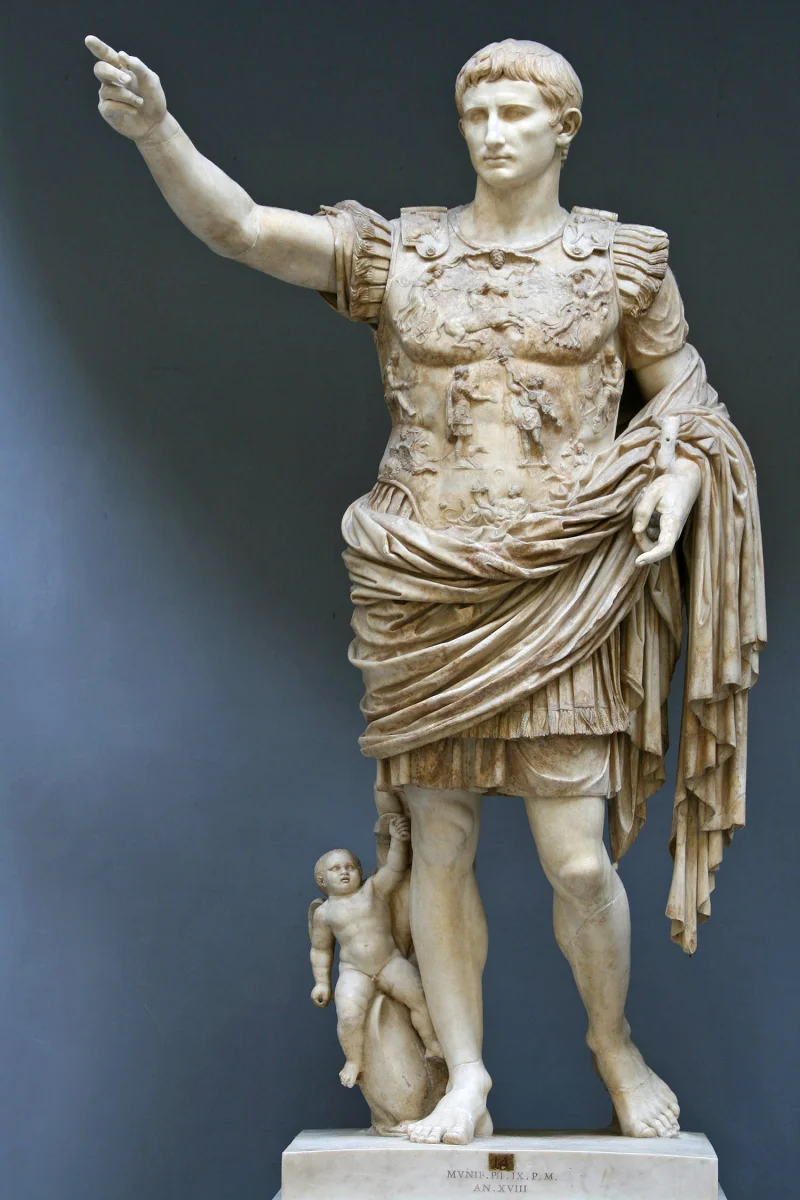Short Summary
Augustus Caesar, originally named Gaius Octavius, was the first Roman emperor, ruling from 27 BC until his death in AD 14. He is celebrated for founding the Roman Empire and initiating the Pax Romana, a period of relative peace and stability across the empire. Augustus' leadership transformed Rome from a republic to an imperial power, and his reign marked the beginning of a new era in Roman history. His legacy endures as one of the greatest leaders in world history.
Early Life & Education
Augustus was born on September 23, 63 BC, in Rome into the wealthy and influential Octavii family. His father, Gaius Octavius, was a senator and governor, while his mother, Atia, was the niece of Julius Caesar. After his father's death, Augustus was raised by his mother and stepfather, Lucius Marcius Philippus. He received a comprehensive education in rhetoric and philosophy, which was customary for Roman nobility. Julius Caesar's influence was significant in his early life, as Augustus was named his adopted son and heir in Caesar's will, setting the stage for his future rise to power.
Career Highlights
Augustus' career began with his involvement in the political turmoil following Julius Caesar's assassination in 44 BC. He formed the Second Triumvirate with Mark Antony and Marcus Lepidus, defeating Caesar's assassins. The Triumvirate eventually dissolved, leading to a power struggle between Augustus and Antony. Augustus emerged victorious at the Battle of Actium in 31 BC, consolidating his control over Rome. In 27 BC, he was granted the title "Augustus" by the Senate, effectively becoming the first Roman emperor. His reign was marked by significant reforms in governance, military, and infrastructure.
Major Achievements
- Established the Roman Empire, transforming Rome from a republic to an imperial power.
- Initiated the Pax Romana, a long period of peace and prosperity throughout the empire.
- Reformed the Roman tax system, ensuring a more efficient and fair collection process.
- Expanded the Roman network of roads, facilitating trade and communication.
- Commissioned numerous building projects, including the Ara Pacis and the Forum of Augustus.
Famous Quotes
- "I found Rome a city of bricks and left it a city of marble."
- "Hasten slowly."
Interesting Facts
- Augustus was the great-nephew and adopted heir of Julius Caesar.
- He survived multiple assassination attempts during his reign.
- He refused the title of dictator, preferring the title "Princeps," meaning "first citizen."
- His reign marked the end of the Roman Republic and the beginning of the Roman Empire.
- Augustus' original name was Gaius Octavius Thurinus.
Legacy / Influence
Augustus Caesar's legacy is profound, as he laid the foundations for the Roman Empire, which lasted for centuries. His establishment of the Pax Romana allowed for unprecedented growth and stability. Augustus' political and administrative reforms influenced subsequent emperors and set the standard for effective governance. His impact on Roman culture, architecture, and law continues to be studied and admired, cementing his place as one of history's most influential leaders.
FAQ
Q: Why is Augustus Caesar famous?
A: Augustus Caesar is famous for being the first Roman emperor and for establishing the Roman Empire.
Q: What was Augustus' original name?
A: Augustus' original name was Gaius Octavius Thurinus.
Q: What was the Pax Romana?
A: The Pax Romana was a period of relative peace and stability across the Roman Empire initiated by Augustus.
Q: How did Augustus come to power?
A: Augustus rose to power after forming the Second Triumvirate, defeating his rivals, and consolidating control over Rome.









